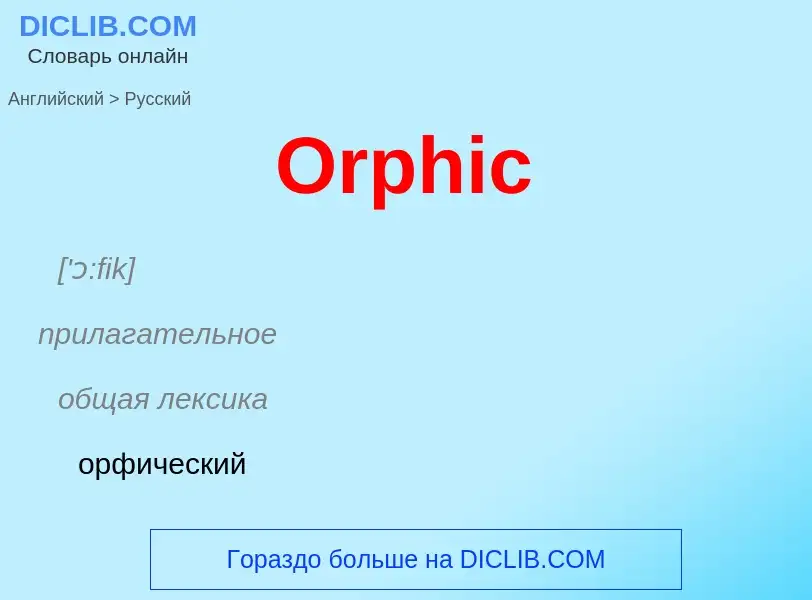Translation and analysis of words by ChatGPT artificial intelligence
On this page you can get a detailed analysis of a word or phrase, produced by the best artificial intelligence technology to date:
- how the word is used
- frequency of use
- it is used more often in oral or written speech
- word translation options
- usage examples (several phrases with translation)
- etymology
Orphic - translation to russian
['ɔ:fik]
прилагательное
общая лексика
орфический
мелодичный
чарующий
как музыка Орфея
мистический
таинственный
оккультный
мистический, таинственный
существительное
['ɔ:fik]
общая лексика
орфическая песнь или орфический гимн
орфики
последователи религиозного учения
основателем которого считается Орфей
Wikipedia
 - Foto G. Dall'Orto.jpg?width=120)
Orphism (more rarely Orphicism; Ancient Greek: Ὀρφικά, romanized: Orphiká) is the name given to a set of religious beliefs and practices originating in the ancient Greek and Hellenistic world, associated with literature ascribed to the mythical poet Orpheus, who descended into the Greek underworld and returned. This type of journey is called a katabasis and is the basis of several hero worships and journeys. Orphics revered Dionysus (who once descended into the Underworld and returned) and Persephone (who annually descended into the Underworld for a season and then returned). Orphism has been described as a reform of the earlier Dionysian religion, involving a re-interpretation or re-reading of the myth of Dionysus and a re-ordering of Hesiod's Theogony, based in part on pre-Socratic philosophy.
The central focus of Orphism is the suffering and death of the god Dionysus at the hands of the Titans, which forms the basis of Orphism's central myth. According to this myth, the infant Dionysus is killed, torn apart, and consumed by the Titans. In retribution, Zeus strikes the Titans with a thunderbolt, turning them to ash. From these ashes, humanity is born. In Orphic belief, this myth describes humanity as having a dual nature: body (Ancient Greek: σῶμα, romanized: sôma), inherited from the Titans, and a divine spark or soul (Ancient Greek: ψυχή, romanized: psukhḗ), inherited from Dionysus. In order to achieve salvation from the Titanic, material existence, one had to be initiated into the Dionysian mysteries and undergo teletē, a ritual purification and reliving of the suffering and death of the god. Orphics believed that they would, after death, spend eternity alongside Orpheus and other heroes. The uninitiated (Ancient Greek: ἀμύητος, romanized: amúētos), they believed, would be reincarnated indefinitely.
In order to maintain their purity following initiation and ritual, Orphics attempted to live an ascetic life free of spiritual contamination, most notably by adhering to a strict vegetarian diet that also excluded broad beans.

 - Foto G. Dall'Orto.jpg?width=200)
![Jacob Bryant's]] ''Orphic Egg'' (1774) with [[Ananke]] Jacob Bryant's]] ''Orphic Egg'' (1774) with [[Ananke]]](https://commons.wikimedia.org/wiki/Special:FilePath/Orphic-egg.png?width=200)
![Gold orphic tablet]] and case found in [[Petelia]], southern Italy ([[British Museum]])<ref>[https://www.britishmuseum.org/research/collection_online/collection_object_details.aspx?objectId=464173&partId=1&searchText=orphic+tablet&page=1 British Museum Collection]</ref></blockquote> Gold orphic tablet]] and case found in [[Petelia]], southern Italy ([[British Museum]])<ref>[https://www.britishmuseum.org/research/collection_online/collection_object_details.aspx?objectId=464173&partId=1&searchText=orphic+tablet&page=1 British Museum Collection]</ref></blockquote>](https://commons.wikimedia.org/wiki/Special:FilePath/Orphic Gold Tablet (Petelia - British Museum, London).jpg?width=200)
